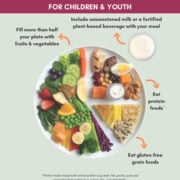Don’t Have Celiac Disease? 5 Reasons NOT to Go Gluten Free!
 A Wave of Popularity Unearths New Risks
A Wave of Popularity Unearths New Risks
- by John Watson, Medscape 1
- As more people adapt gluten-free diets, it has given researchers a larger body of evidence to assess their effect. And according to recent data, far from providing the intended health benefits for people who don’t medically require them, gluten-free diets may in fact pose notable health risks.
It’s been more than a decade since the gluten-free diet entered the popular culture, buoyed by the time-tested marketing power of celebrity endorsements and incessant press coverage. In its wake were the suddenly unfashionable fad diets that came before: Atkins, South Beach, Scarsdale.
What separates them, however, is that gluten-free diets originate from actual medical necessity. For the estimated 1% of the population with celiac disease, this dietary trend’s emergence has been nothing short of serendipitous. Once-frustrating trips to restaurants and supermarkets have become infinitely more navigable.
“The general population’s interest in a gluten-free diet has helped me tremendously,” said Maureen Leonard, MD, MMSc, clinical director of the Center for Celiac Research and Treatment at MassGeneral Hospital for Children in Boston, and herself a person with celiac disease. “There are so many more gluten-free options at grocery stores. There is also greater availability and awareness at restaurants now compared with 10 years ago.”
Dr Leonard sees the rise of going gluten-free as the latest stage in an old dietary dictum: Less is more.
- “Prior to the gluten-free diet, publicity was centered around eating fat-free, sugar-free, or sodium-free, so the idea that food that is free from something, in many people’s minds, means that it is better for you and healthier.”
The messaging appears to be working, with a Consumer Reports survey indicating that 63% of people following these diets believe that it improves physical or mental health. The upside for the millions of people who commit to these diets despite the lack of medical need, however, is decidedly more questionable, according to David A. Johnson, MD, professor of medicine and chief of gastroenterology at Eastern Virginia Medical School in Norfolk, Virginia.
“This represents a tremendous misunderstanding by patients, but also by care providers,” he said. “Anything can potentially harm if it’s not needed and misdirected.”
Here’s a look at the latest findings on five risks that practitioners need to be aware of in their patients who’ve gone gluten-free.
Weighing the Established Risks
1. Cardiovascular Disease
A key argument among adherents of gluten-free diets has been the idea that gluten may promote inflammation even in those without celiac disease, so removing it could reduce atherosclerosis and associated cardiac morbidity.
In 2017, a paper published in BMJ directly tested this theory by accessing the vast pools of self-reported dietary data from the Nurses’ Health Study and the Health Professionals Follow-up Study. Looking at more than 100,000 participants without celiac disease over 25 years of follow-up, they reported a surprisingly contradictory finding: Eating gluten-containing foods was not significantly associated with risk for coronary heart disease. In fact, those who reported the lowest amount of gluten intake had a slightly higher unadjusted rate of coronary heart disease than those reporting the highest intake.
“These large prospective studies have shown unequivocally that this is not necessarily cardiac preventive, and it may be somewhat cardiac harmful due to the avoidance of certain beneficial foods like whole grains,” said Dr Johnson.
2. Nutrient Deficiencies
The popularity of gluten-free foods among the general public hinges on relatively vague claims regarding their health value. Yet, a 2016 review of the literature on gluten-free foods found that they were severely lacking in key nutrients.[6]
For a food movement often touted for “going against the grain,” it’s no surprise that a main concern is a lower intake of alimentary fiber, which is particularly troubling given the established link between the intake of fiber and the reduced risk for colon cancer and cardiovascular disease. Deficiencies in the key nutrients of folate, vitamin B12, vitamin D, calcium, iron, zinc, and magnesium are also commonly reported with these diets.
These nutrient deficiencies are so established in the celiac disease population that nutritionists are routinely incorporated into patients’ care teams to provide balanced substitutions.
“For that reason, our recommendation to ingest an unprocessed, gluten-free diet, rich in a mix of ancient whole grains and based primarily on whole foods, has not changed,” said Dr Leonard.
Emerging Concerns
3. Obesity and Diabetes
If something is missing from gluten-free foods, the question then becomes what is being added. Often the answer is sugar, calories, and fat.
“While the gluten-free diet is essential for health for patients with celiac disease or non-celiac gluten sensitivity, we have known that, in general, the gluten-free diet is not a healthier diet or one which would induce weight loss by simply comparing serving size and labels on gluten-containing versus gluten-free products,” said Dr Leonard.
If something is missing from gluten-free foods, the question then becomes what is being added. Often the answer is sugar, calories, and fat.
The gluten-free diet has been associated with an increased risk for obesity, given the high glycemic load of many of these foods. Conversely, a recent analysis of data from the National Health and Nutrition Examination Survey (NHANES) found that gluten-free diets were not significantly associated with a reduction in metabolic syndrome risk.
When taken together with the diminished role of fiber, which is known to curtail the development of diabetes, gluten-free diets may prove a quicker path to the disorders they seek to prevent.
4. Arsenic and Heavy Metal Exposure
An emerging risk of gluten-free diets is their potential to expose adherents to heavy metals and other harmful contaminants.
In a recently published report, researchers looking at the NHANES database compared the blood and urine of participants who were on a gluten-free diet (n = 115) against those who were not (n = 11,239). They found that those following gluten-free diets had significantly higher levels of total arsenic, mercury, lead, and cadmium, perhaps owning to an overreliance on foods such as rice and seafood. Although only the arsenic levels were in ranges considered toxic, the overall trend was nonetheless troubling.
“We still do not know whether these findings have long-term clinical implications,” said Dr Leonard. “Therefore, further research needs to be done and the strongest evidence has yet to be uncovered.”
5. Cost
If risks to their bodies prove unpersuasive when trying to steer patients away from gluten-free diets, there is another target to aim for: their wallets.
A 2015 survey of gluten-free foods available in UK supermarkets found that they were four times as expensive as their non-gluten-free counterparts. An Austrian study published the same year reported that gluten-free cereals and bakery goods cost, on average, 200% more than their gluten-containing products. These cost discrepancies are also on display in the United States, according to Consumer Reports, where gluten-free foods were found to cost at least twice as much as gluten-containing products.
Putting Your Patients on the Best Dietary Path
A secondary impact of the boom in gluten-free diets is that it may be identifying patients with undiagnosed celiac disease or other gluten sensitivities, such as to FODMAPs (fermentable, oligosaccharides, disaccharides, monosaccharides, polyols).
“By exclusion of gluten, there may be some positive response in some patients who are sensitive to other things in the FODMAP diet, such as those with irritable bowel syndrome,” said Dr Johnson. “It doesn’t mean that they need it for preventing disease, but it may make them feel better. It may be that by restricting or avoiding these elements, and the response of the gut bacteria, they’re potentially having fewer symptoms.”
According to Dr Leonard, there remains something positive underlying the trend for gluten-free diets, in that it shows people are paying more attention to what’s in their food, where it comes from, how it makes them feel.
“As a physician, I think this is great because I hope it will lead to diets more focused on fruits, vegetables, whole grains, fiber, and unprocessed foods. This could in turn work to reduce obesity, heart disease and type 2 diabetes. Unfortunately, there is no marketing campaign for foods like cucumbers, sweet potatoes, or quinoa, so the public hears more about a gluten-free diet than a Mediterranean diet.”
- There [is] something positive underlying the trend … People are paying more attention to what’s in their food.
Until the Mediterranean diet gets a better press agent, healthcare providers are likely to continue encountering many more patients going gluten-free. It will be up to them to educate their patients about the very significant risks lying beneath the hype.
1. https://www.medscape.com/viewarticle/892520?src=wnl_edit_tpal#vp_1













